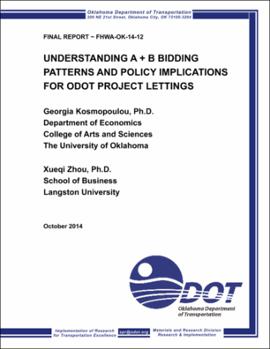| dc.creator | Kosmopoulou, Georgia | |
| dc.creator | Zhou, Xueqi | |
| dc.date.accessioned | 2018-01-05T19:47:43Z | |
| dc.date.available | 2018-01-05T19:47:43Z | |
| dc.date.issued | 2014-10 | |
| dc.identifier.govdoc | FHWA-OK-14-12 | |
| dc.identifier.other | Oklahoma Department of Transportation State Planning and Research item number 2257 | |
| dc.identifier.uri | https://hdl.handle.net/11244/54302 | |
| dc.description.abstract | A key challenge for Departments of Transportation around the country is to keep the cost of construction low while ensuring that projects will be completed in a timely manner. Those goals can often be conflicting. The purpose of this research project was to investigate the empirical relationship between project cost and project duration to offer recommendations to the Department of Transportation on the optimal use of time incentives in the procurement process. | |
| dc.description.abstract | We first surveyed all Transportation Agencies on their rules of implementation of A+B and incentive/disincentive designs. A complete survey of A+B and I/D letting practice is presented. Policy details such as application, scope and parameter choice are included in the report. | |
| dc.description.abstract | We utilized program evaluation techniques to assess the performance of A+B bidding in comparison to the standard contracting low bid practice. Using our statistical knowledge and information on alternative contracting methods adopted by ODOT and other state Departments of Transportation, we conducted economic evaluation of contracting practices. The end goal was to prepare guidelines for distinguishing between costly projects and those that are economically practical to speed up, and help ODOT to improve efficiency in highway construction. | |
| dc.description.abstract | We found evidence that item bids respond to the time incentive asymmetrically. As an example, items 202(C)0184 (Unclassified Borrow) and 619(B)2500 (Removal of Bridge Items) display especially favorable reactions to time incentives and hence projects that prescribe such items more heavily are desirable candidates for A+B letting consideration. There is evidence suggesting that bids (and the underlying cost) rise less steeply than for other items when time is a constraint. Naturally, acceleration on such items may be achieved at a relatively lower cost to the state department. | |
| dc.format.extent | 57 pages | |
| dc.format.extent | 1,302,720 bytes | |
| dc.format.medium | application.pdf | |
| dc.language | en_US | |
| dc.relation.ispartofseries | No | |
| dc.relation.requires | Adobe Acrobat Reader | |
| dc.relation.uri | http://www.okladot.state.ok.us/Research/FinalRep_2257_FHWA-OK-14-12.pdf | |
| dc.title | UNDERSTANDING A + B BIDDING PATTERNS AND POLICY IMPLICATIONS FOR ODOT PROJECT LETTINGS | |
| dc.type | Technical Report | |
| dc.description.version | Final report, October 2013-September 2014 | |
| dc.description.peerreview | No | |
| dc.type.material | text | |
| dc.subject.keywords | Lettings | |
| dc.subject.keywords | Bidding | |
| dc.subject.keywords | A+B bidding | |
| dc.subject.keywords | Program Evaluation | |
| dc.contributor.sponsor | Oklahoma Department of Transportation. Materials and Research Division. Office of Research & Implementation | |
